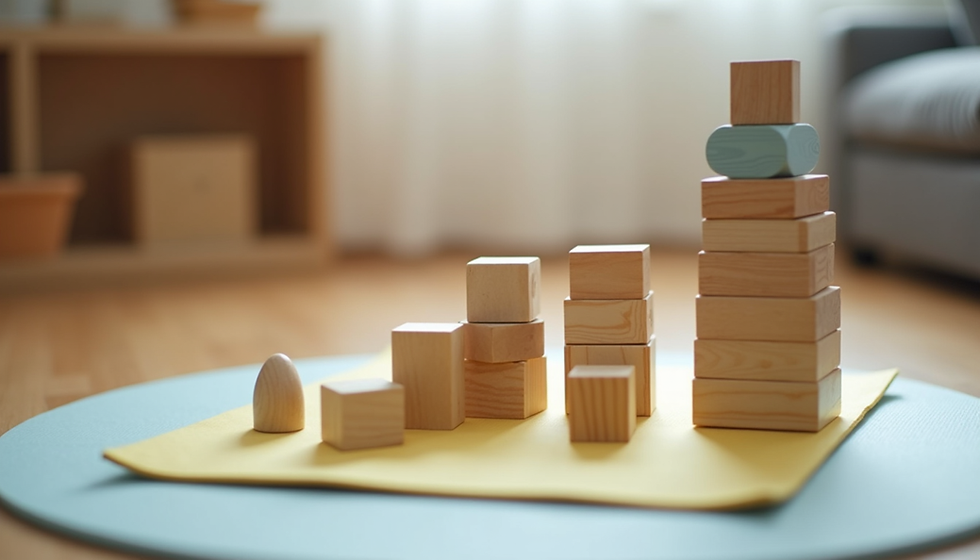How Montessori Toys Promote Independent Learning in Kids
- G MANASA
- May 31, 2025
- 4 min read
Montessori toys offer a unique approach to early childhood education that encourages independent learning and exploration. Designed with a child’s developmental needs in mind, these educational tools empower kids to learn at their own pace while stimulating their curiosity and creativity.
Understanding Montessori Toys
Montessori toys are specifically designed to align with the principles of the Montessori teaching method, which emphasizes hands-on, experiential learning. Unlike traditional toys, these educational tools focus on promoting skills rather than just entertainment. They often feature natural materials, simple designs, and open-ended play opportunities.
Benefits of Montessori Toys
Montessori toys present numerous benefits for young learners. The key highlights include:
Encouragement of Independence: Montessori toys encourage children to explore and learn without constant adult supervision. This nurtures their ability to make decisions and solve problems independently. For instance, puzzles that require problem-solving help children feel accomplished and confident when they complete them.
Promotion of Fine Motor Skills: Many Montessori toys, such as stacking blocks or threading beads, are designed to enhance fine motor skills. These activities strengthen hand-eye coordination and dexterity, crucial for tasks such as writing later in life.
Supports Cognitive Development: Montessori toys often stimulate cognitive development by encouraging critical thinking and reasoning skills. Consider toys that require sorting, classifying, or sequencing, which help children understand patterns and develop logical thinking.

How Montessori Toys Foster Problem-Solving Skills
Montessori toys provide an excellent platform for children to develop problem-solving skills. For example, a typical Montessori tower set challenges children to figure out balancing blocks of different shapes and sizes. As they navigate these challenges, kids learn to evaluate their options and make thoughtful decisions.
Research supports the importance of problem-solving skills in early childhood. According to a study published in Early Education and Development, children who engage in play that promotes problem-solving show higher levels of cognitive development. By offering toys that require kids to experiment and explore, parents can support this essential aspect of growth.
Encouraging Exploration and Curiosity
Montessori toys also promote exploration and curiosity, which are critical for cognitive growth. These toys often have a natural appeal due to their textures, colors, and shapes. When children encounter toys that captivate their interest, they are much more likely to engage with them.
For instance, open-ended playthings like building blocks encourage children to create their own structures. This freedom allows them to explore their ideas, test hypotheses, and even learn about cause and effect as they stack and balance blocks.

The Role of Natural Materials in Learning
One of the distinctive features of Montessori toys is their use of natural materials. Items made from wood, fabric, or metal stimulate the senses in a way that plastic toys cannot. The tactile experience of touching different materials enhances sensory development, which is vital for young children.
Natural materials can also help children develop a respect for the environment. By playing with sustainably sourced products, kids learn about the importance of caring for nature. This connection can foster a sense of responsibility and awareness of the world around them.
Choosing the Right Montessori Toys
When selecting Montessori toys, parents and educators should keep several factors in mind:
Age Appropriateness: Toys should be suitable for the child's age and developmental stage. Always check labels for recommended ages, as certain toys may pose safety risks for younger children.
Open-Endedness: Look for toys that can be used in multiple ways. Open-ended toys encourage creativity and allow children to explore various outcomes based on their ideas.
Quality Over Quantity: It is better to have a few high-quality Montessori toys than many low-quality options. Quality toys stand the test of time and can provide endless opportunities for learning.
The value of a montessori educational toy lies in its ability to engage children in meaningful play and learning experiences.

Nurturing Lifelong Learning Skills
The effects of playing with Montessori toys can transcend childhood into adulthood. By fostering independence, problem-solving, and critical thinking skills, these toys help prepare children for future academic and social settings. The ability to think critically and act independently is invaluable in today’s rapidly changing world.
Incorporating Montessori toys at home is straightforward. Parents can create a dedicated play area equipped with various Montessori materials, encouraging children to engage in meaningful play. Regularly changing the toys keeps the environment stimulating and intriguing.
Final Thoughts
Montessori toys are more than just playthings; they are tools that promote independent learning through exploration and creativity. They help children develop essential skills that will serve them for a lifetime. Choosing the right Montessori toys for your children can create an enriching environment that nurtures their natural curiosity and autonomy.
By embracing these educational tools, parents and caregivers can set a strong foundation for lifelong learning and a love for exploration. Investing in quality Montessori toys not only provides children with engaging play but also strengthens their problem-solving abilities, enhances cognitive development, and encourages them to pursue knowledge throughout their lives.



Comments